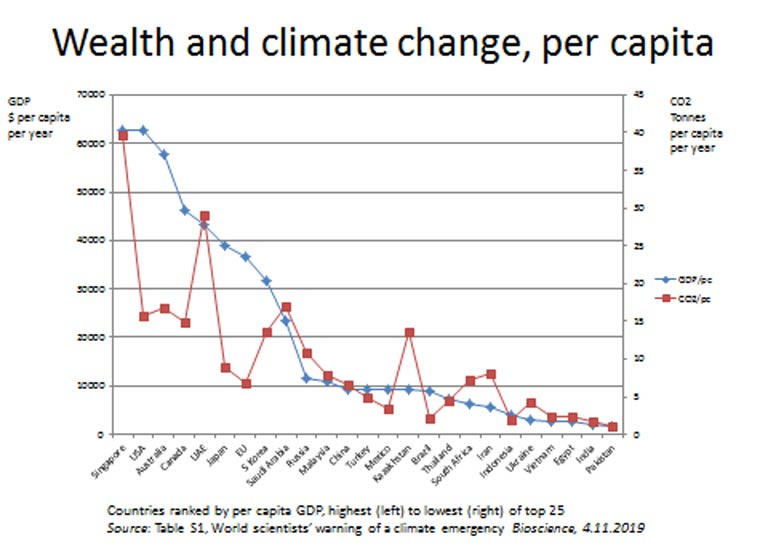Inequalities and climate change
World scientists have collectively endorsed the proposition that the world is facing a climate emergency. Social scientists need to address the burning issue of inequality at the heart of this emergency.
World scientists (11,258 from 153 countries) have collectively endorsed the proposition that the world is facing a climate emergency (Bioscience, 4.11.2019). They state broadly that ‘excessive consumption of the wealthy lifestyle’ in the most affluent countries is responsible for the highest per capita emissions of greenhouse gases. Wealth inequalities between different societies are directly related to how they generate climate change: the greater the per capita wealth the greater the per capita climate impact.

A graph showing wealth and climate change per capita.
At a societal level, these broad and rather crude relationships demonstrate a socio-economic dimension to the climate emergency. We rightly acknowledge the contribution of environmental scientists, who still, by and large, talk of humanity-in-general, and anthropogenic climate change. Societal wealth inequalities, however, call for a change in mindset and a concept of sociogenic climate change. The average wealth of an American is over six times greater than that of a Chinese citizen, and their per capita CO2 emissions are correspondingly nearly two and a half times greater. The contrast with India is even starker: the average American is over 30 times wealthier than the average Indian and emits nearly nine times more CO2.
The graph, however, is crude from a sociogenic perspective. It doesn’t address the inequalities of wealth and corresponding inequalities of C02 emissions within societies, whether in the USA or in China. When environmental scientists refer broadly to wealthy lifestyles, there is a need for more refinement from social scientists than to finger the top one percent of mansion-owning, private jet globe-trotting, global elite.
A brief inspection of the graph suggests that those countries where per capita wealth is disproportionately related to oil production (United Arab Emirates, Saudi Arabia, Iran) are related to spikes in the curve in terms of per capita CO2 equivalent emissions. Different societies are endowed with different environmental resources – including fossil fuel reserves. Again, we have sociogenic climate change.
Conversely, Brazil and Japan are notable ‘dips’ in the relation between per capita wealth and per capita CO2 emissions. Brazil is endowed with natural resources for hydroelectric power and has had a national policy to replace fossil fuels with biofuels. Japan, by contrast, was faced with a severe lack of natural energy self-sufficiency and has depended heavily on nuclear energy for its post-second World War economic development, reducing its reliance on imported oil or coal. National economic developmental policies, accidentally or deliberately, can have profound consequences for the climate change impacts of different countries. Different societies inhabit very different resource environments, whether for energy and food. These societal resource inequalities then condition both development strategies and international trade.
Natural scientists collectively have issued a challenge. As social scientists, we also have a challenge. Inequalities, between and within societies, are at the core of the climate emergency. We need to collaboratively and collectively address this planet-burning issue.
Mark Harvey is an Honorary Professor at the Sustainable Consumption Institute and Department of Sociology, the University of Manchester and Emeritus Professor at the Department of Sociology, University of Essex.

0 Comments